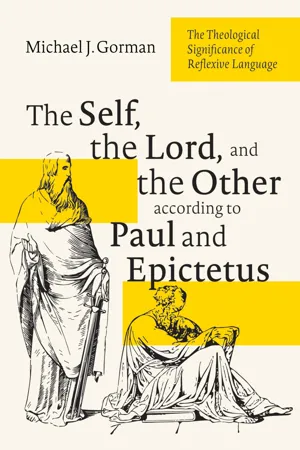
The Self, the Lord, and the Other according to Paul and Epictetus
The Theological Significance of Reflexive Language
- 540 pages
- English
- ePUB (mobile friendly)
- Available on iOS & Android
The Self, the Lord, and the Other according to Paul and Epictetus
The Theological Significance of Reflexive Language
About This Book
This study explores the relationship between the individual person (the self), the divine, and other people in the writings of the apostle Paul and the Roman Stoic Epictetus. It does so by examining self-involving actions expressed with reflexive pronouns (myself, yourself, etc.) in various kinds of sentences: for example, "Examine yourself" and "You do not belong to yourself." After situating the topic within the fields of linguistics and ancient Greek, the study then examines the reflexive constructions in Epictetus's Discourses, showing that reflexive texts express fundamental aspects of his ethic of rational self-interest in imitation of the indwelling rational deity. Next, the investigation examines the 109 reflexive constructions in Paul, providing an exegesis of each reflexive text and then synthesizing the results. Paul's reflexive phrases are essential statements of his theology and ethics, expressing an interconnected narrative Christology, narrative apostolic identity, and narrative ethic. Most importantly, the study finds that for Epictetus, concern for others is a rational means to self-realization, whereas for Paul, concern for others is a community ethic grounded in the story of the indwelling Christ and is the antithesis of self-interest.
Frequently asked questions
Information
Table of contents
- Title Page
- Preface
- Acknowledgments for the Original Study
- Acknowledgments for the Present Book
- Abbreviations
- Original Abstract
- Introduction
- Part One: The Syntax and Semantics of the Reflexive Pronoun and Reflexive Phrases
- Part Two: Reflexive Pronoun Constructions in the Discourses of Epictetus
- Part Three: Reflexive Pronoun Constructions in the Letters of Paul
- Part Four: The Significance of the Reflexive Pronoun and Reflexive Phrases in Paul’s Letters Compared to Epictetus’s Discourses
- Summary and Conclusions
- Original Bibliography
- Supplemental Bibliography